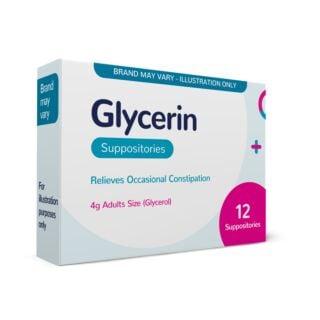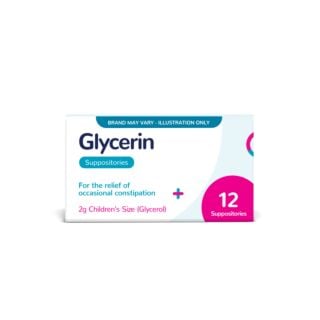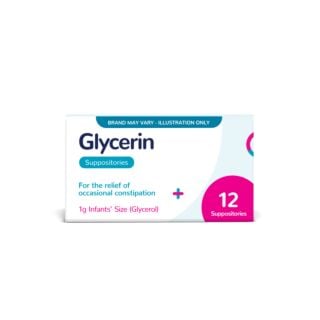Glycerin Suppositories
If you're suffering from constipation, glycerin suppositories could be just what you need to help get things moving again. … Read More See less
Glycerin suppositories are a type of medicine called a hyperosmotic laxative, which works by drawing water into the intestines and resulting in a bowel movement within just 15 to 60 minutes.

Free delivery when you spend over £30

100% discreet delivery for every item ordered

Fully regulated UK pharmacy
Are glycerin suppositories suitable for infants?
Glycerin suppositories come in various doses suitable for adults, children and infants. If your child is aged 1 or under, make sure the glycerin suppositories you’re buying are specifically made for infants. The typical dose for infants is 1g, for children 2g and for adults 4g.
How do glycerin suppositories work?
Glycerin suppositories are a type of medicine called a hyperosmotic laxative. These medicines work by drawing water into the intestines, which can cause a bowel movement within 15 to 60 minutes, relieving the discomfort caused by constipation.
How do I relieve constipation?
You’re usually able to treat constipation yourself with just a few simple changes to your lifestyle and diet - which you can also try if you’re pregnant.
Try increasing the amount of fibre in your diet and the amount of fluid you drink (avoid alcohol) as it may make your stool easier to pass.
By increasing the amount of exercise you do, it will improve how often you need to use the toilet.
If none of these changes work for your constipation, your healthcare provider might recommend an enema, which softens the stool to make it easier to pass.
What’s the best constipation medicine for me?
The best type of constipation medicine for you will depend on what has caused your constipation in the first place.
For example, if your constipation is caused by dehydration you may need to take a different laxative than you would if your constipation is caused by a side effect of medication.
We’d recommend speaking to your doctor or pharmacist and asking them to recommend the best constipation medicine for you if you’re at all unsure.
What kind of constipation do I have?
In order to get the best treatment for your constipation, you need to know what type of constipation you have.
There are two types of constipation, mild and severe. The issues caused will be the same, just the impact of them will differ.
The other way to know what type of constipation you have will involve looking into the abyss.
Well, actually it’s your toilet but they both lead to a dark place.
What is constipation?
Constipation isn’t just about not being able to go to the toilet - rather, it describes a collection of symptoms that include hard, pellet-like stools; excessive straining, a sensation that you are unable to go, and a decrease in bowel movements.
The source of constipation varies, but it could be caused by medication, lack of fibre, dehydration, stress, exercise, hormones, or ignoring the urge to go to the toilet.
However, it’s important to remember that constipation is subjective to the individual, and it’s very normal to not have a daily bowel movement.










